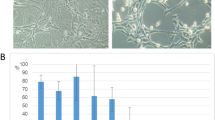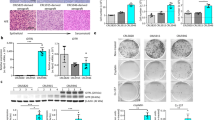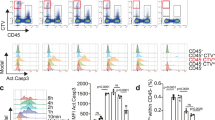Abstract
Malignant mesothelioma (MM) remains a highly deadly malignancy with poor treatment option. The MM cells further promote a highly inflammatory microenvironment, which contributes to tumor initiation, development, severity and propagation. We reasoned that the anti-inflammatory actions of mesenchymal stromal cells (MSCs) and further antitumor effects of MSCs engineered to overexpress tumor necrosis factor-related apoptosis-inducing ligand (TRAIL) protein (MSC-TRAIL) would effectively inhibit mesothelioma growth. Using a mouse xenograft model of intraperitoneal human mesothelioma, native mouse (mMSCs) or human (hMSC) MSCs were administered either systemically (intravenously or intraperitoneally) at various times following tumor inoculation. Both mMSCs and hMSCs localized at the sites of MM tumor growth in vivo and decreased local inflammation. Further, a trend towards decrease in tumor burden was observed. Parallel studies of in vitro exposure of nine primary human mesothelioma cell lines to mMSCs or hMSCs demonstrated reduced tumor cell migration. MSC-TRAIL exposure induced apoptosis of TRAIL-sensitive MM cells in vitro, and both mouse and human MSC-TRAIL significantly reduced the inflammatory tumor environment in vivo. Moreover, human MSC-TRAIL administration significantly reduced peritoneal tumor burden in vivo and increased tumor cell apoptosis. These proof-of-concept studies suggest that TRAIL-expressing MSCs may be useful against malignant mesothelioma.
This is a preview of subscription content, access via your institution
Access options
Subscribe to this journal
Receive 12 print issues and online access
$259.00 per year
only $21.58 per issue
Buy this article
- Purchase on Springer Link
- Instant access to full article PDF
Prices may be subject to local taxes which are calculated during checkout






Similar content being viewed by others
References
Heintz NH, Janssen-Heininger YM, Mossman BT . Asbestos, lung cancers, and mesotheliomas: from molecular approaches to targeting tumor survival pathways. Am J Respir Cell Mol Biol 2010; 42: 133–139.
Hillegass JM, Shukla A, Lathrop SA, MacPherson MB, Beuschel SL, Butnor KJ et al. Inflammation precedes the development of human malignant mesotheliomas in a SCID mouse xenograft model. Ann NY Acad Sci 2010; 1203: 7–14.
Izzi V, Masuelli L, Tresoldi I, Foti C, Modesti A, Bei R . Immunity and malignant mesothelioma: from mesothelial cell damage to tumor development and immune response-based therapies. Cancer Lett 2012; 322: 18–34.
Linton A, van Zandwijk N, Reid G, Clarke S, Cao C, Kao S . Inflammation in malignant mesothelioma—friend or foe? Ann Cardiothorac Surg 2012; 1: 516–522.
Shukla A, Gulumian M, Hei TK, Kamp D, Rahman Q, Mossman BT . Multiple roles of oxidants in the pathogenesis of asbestos-induced diseases. Free Radic Biol Med 2003; 34: 1117–1129.
Ray M, Kindler HL . Malignant pleural mesothelioma: an update on biomarkers and treatment. Chest 2009; 136: 888–896.
Sterman DH, Recio A, Haas AR, Vachani A, Katz SI, Gillespie CT et al. A phase I trial of repeated intrapleural adenoviral-mediated interferon-beta gene transfer for mesothelioma and metastatic pleural effusions. Mol Ther 2010; 18: 852–860.
Prockop DJ, Oh JY . Medical therapies with adult stem/progenitor cells (MSCs): a backward journey from dramatic results in vivo to the cellular and molecular explanations. J Cell Biochem 2012; 113: 1460–1469.
Corselli M, Chen CW, Crisan M, Lazzari L, Peault B . Perivascular ancestors of adult multipotent stem cells. Arterioscler Thromb Vasc Biol 2010; 30: 1104–1109.
Hodgkinson CP, Gomez JA, Mirotsou M, Dzau VJ . Genetic engineering of mesenchymal stem cells and its application in human disease therapy. Hum Gene Ther 2010; 21: 1513–1526.
Hong HS, Kim YH, Son Y . Perspectives on mesenchymal stem cells: tissue repair, immune modulation, and tumor homing. Arch Pharm Res 2012; 35: 201–211.
Keating A . Mesenchymal stromal cells: new directions. Cell Stem Cell 2012; 10: 709–716.
Le Blanc K, Mougiakakos D . Multipotent mesenchymal stromal cells and the innate immune system. Nat Rev Immunol 2012; 12: 383–396.
Peister A, Mellad JA, Larson BL, Hall BM, Gibson LF, Prockop DJ . Adult stem cells from bone marrow (MSCs) isolated from different strains of inbred mice vary in surface epitopes, rates of proliferation, and differentiation potential. Blood 2004; 103: 1662–1668.
Prockop DJ, Oh JY . Mesenchymal stem/stromal cells (MSCs): role as guardians of inflammation. Mol Ther 2012; 20: 14–20.
Porada CD, Almeida-Porada G . Mesenchymal stem cells as therapeutics and vehicles for gene and drug delivery. Adv Drug Deliv Rev 2010; 62: 1156–1166.
Rebellato LM, Dobbs LJ Jr . Haploidentical transplantation. Importance of histocompatibility testing and chimerism studies in allogeneic bone marrow/stem cell transplantation. J Infus Nurs 2001; 24: 311–318.
Ciavarella S, Grisendi G, Dominici M, Tucci M, Brunetti O, Dammacco F et al. In vitro anti-myeloma activity of TRAIL-expressing adipose-derived mesenchymal stem cells. Br J Haematol 2012; 157: 586–598.
Kim SM, Woo JS, Jeong CH, Ryu CH, Lim JY, Jeun SS . Effective combination therapy for malignant glioma with TRAIL-secreting mesenchymal stem cells and lipoxygenase inhibitor MK886. Cancer Res 2012; 72: 4807–4817.
Kim SW, Kim SJ, Park SH, Yang HG, Kang MC, Choi YW et al. Complete regression of metastatic renal cell carcinoma by multiple injections of engineered mesenchymal stem cells expressing dodecameric TRAIL and HSV-TK. Clin Cancer Res 2013; 19: 415–427.
Loebinger MR, Eddaoudi A, Davies D, Janes SM . Mesenchymal stem cell delivery of TRAIL can eliminate metastatic cancer. Cancer Res 2009; 69: 4134–4142.
Loebinger MR, Sage EK, Davies D, Janes SM . TRAIL-expressing mesenchymal stem cells kill the putative cancer stem cell population. Br J Cancer 2010; 103: 1692–1697.
Moniri MR, Sun XY, Rayat J, Dai D, Ao Z, He Z et al. TRAIL-engineered pancreas-derived mesenchymal stem cells: characterization and cytotoxic effects on pancreatic cancer cells. Cancer Gene Ther 2012; 19: 652–658.
Mueller LP, Luetzkendorf J, Widder M, Nerger K, Caysa H, Mueller T . TRAIL-transduced multipotent mesenchymal stromal cells (TRAIL-MSC) overcome TRAIL resistance in selected CRC cell lines in vitro and in vivo. Cancer Gene Ther 2011; 18: 229–239.
Reagan MR, Seib FP, McMillin DW, Sage EK, Mitsiades CS, Janes SM et al. Stem cell implants for cancer therapy: TRAIL-expressing mesenchymal stem cells target cancer cells in situ. J Breast Cancer 2012; 15: 273–282.
Holoch PA, Griffith TS . TNF-related apoptosis-inducing ligand (TRAIL): a new path to anti-cancer therapies. Eur J Pharmacol 2009; 625: 63–72.
Belyanskaya LL, Marti TM, Hopkins-Donaldson S, Kurtz S, Felley-Bosco E, Stahel RA . Human agonistic TRAIL receptor antibodies Mapatumumab and Lexatumumab induce apoptosis in malignant mesothelioma and act synergistically with cisplatin. Mol Cancer 2007; 6: 66.
Li Q, Verschraegen CF, Mendoza J, Hassan R . Cytotoxic activity of the recombinant anti-mesothelin immunotoxin, SS1(dsFv)PE38, towards tumor cell lines established from ascites of patients with peritoneal mesotheliomas. Anticancer Res 2004; 24: 1327–1335.
Lee RH, Seo MJ, Pulin AA, Gregory CA, Ylostalo J, Prockop DJ . The CD34-like protein PODXL and alpha6-integrin (CD49f) identify early progenitor MSCs with increased clonogenicity and migration to infarcted heart in mice. Blood 2009; 113: 816–826.
Shukla A, Miller JM, Cason C, Sayan M, MacPherson MB, Beuschel SL et al. Extracellular signal-regulated kinase 5: a potential therapeutic target for malignant mesotheliomas. Clin Cancer Res 2013; 19: 2071–2083.
Toyooka S, Pass HI, Shivapurkar N, Fukuyama Y, Maruyama R, Toyooka KO et al. Aberrant methylation and simian virus 40 tag sequences in malignant mesothelioma. Cancer Res 2001; 61: 5727–5730.
Hillegass JM, Blumen SR, Cheng K, MacPherson MB, Alexeeva V, Lathrop SA et al. Increased efficacy of doxorubicin delivered in multifunctional microparticles for mesothelioma therapy. Int J Cancer 2011; 129: 233–244.
Zar JH . Biostatistical Analysis, 5th edn. Prentice-Hall/Pearson: Upper Saddle River, NJ, USA, 2010.
Shukla A, Hillegass JM, MacPherson MB, Beuschel SL, Vacek PM, Butnor KJ et al. ERK2 is essential for the growth of human epithelioid malignant mesotheliomas. Int J Cancer 2011; 129: 1075–1086.
Reagan MR, Kaplan DL . Concise review: mesenchymal stem cell tumor-homing: detection methods in disease model systems. Stem Cells 2011; 29: 920–927.
Cyranoski D . Canada approves stem cell product. Nat Biotech 2012; 30: 571.
Lalu MM, McIntyre L, Pugliese C, Fergusson D, Winston BW, Marshall JC et al. Safety of cell therapy with mesenchymal stromal cells (SafeCell): a systematic review and meta-analysis of clinical trials. PLoS One 2012; 7: e47559.
von Bahr L, Batsis I, Moll G, Hägg M, Szakos A, Sundberg B et al. Analysis of tissues following mesenchymal stromal cell therapy in humans indicates limited long-term engraftment and no ectopic tissue formation. Stem Cells 2012; 30: 1575–1578.
Jube S, Rivera ZS, Bianchi ME, Powers A, Wang E, Pagano I et al. Cancer cell secretion of the DAMP protein HMGB1 supports progression in malignant mesothelioma. Cancer Res 2012; 72: 3290–3301.
Ben-Ami E, Berrih-Aknin S, Miller A . Mesenchymal stem cells as an immunomodulatory therapeutic strategy for autoimmune diseases. Autoimmun Rev 2011; 10: 410–415.
Gregory LA, Ricart RA, Patel SA, Lim PK, Rameshwar P . microRNAs, gap junctional intercellular communication and mesenchymal stem cells in breast cancer metastasis. Curr Cancer Ther Rev 2011; 7: 176–183.
Sage E, Kolluri K, Giangreco A, Janes S . S60 Mesenchymal stem cells expressing TRAIL induce apoptosis in malignant pleural mesothelioma. Thorax 2011; 66 (Suppl 4): A29.
Hillegass JM, Shukla A, MacPherson MB, Lathrop SA, Alexeeva V, Perkins TN et al. Mechanisms of oxidative stress and alterations in gene expression by Libby six-mix in human mesothelial cells. Part Fibre Toxicol 2010; 7: 26.
Liu W, Bodle E, Chen JY, Gao M, Rosen GD, Broaddus VC . Tumor necrosis factor-related apoptosis-inducing ligand and chemotherapy cooperate to induce apoptosis in mesothelioma cell lines. Am J Respir Cell Mol Biol 2001; 25: 111–118.
Liu S, Ginestier C, Ou SJ, Clouthier SG, Patel SH, Monville F et al. Breast cancer stem cells are regulated by mesenchymal stem cells through cytokine networks. Cancer Res 2011; 71: 614–624.
Mossman BT, Shukla A, Heintz NH, Verschraegen CF, Thomas A, Hassan R . New insights into understanding the mechanisms, pathogenesis, and management of malignant mesotheliomas. Am J Pathol 2013; 182: 1065–1077.
Fan Y, Dutta J, Gupta N, Fan G, Gelinas C . Regulation of programmed cell death by NF-kappaB and its role in tumorigenesis and therapy. Adv Exp Med Biol 2008; 615: 223–250.
Choi H, Lee RH, Bazhanov N, Oh JY, Prockop DJ . Anti-inflammatory protein TSG-6 secreted by activated MSCs attenuates zymosan-induced mouse peritonitis by decreasing TLR2/NF-kappaB signaling in resident macrophages. Blood 2011; 118: 330–338.
Kim J, Hematti P . Mesenchymal stem cell-educated macrophages: a novel type of alternatively activated macrophages. Exp Hematol 2009; 37: 1445–1453.
Lee RH, Yoon N, Reneau JC, Prockop DJ . Preactivation of human MSCs with TNF-alpha enhances tumor-suppressive activity. Cell Stem Cell 2012; 11: 825–835.
Yan TD, Deraco M, Baratti D, Kusamura S, Elias D, Glehen O et al. Cytoreductive surgery and hyperthermic intraperitoneal chemotherapy for malignant peritoneal mesothelioma: multi-institutional experience. J Clin Oncol 2009; 27: 6237–6242.
Acknowledgements
We thank John Wallis, Zach Borg and Darcy Wagner, PhD, for technical assistance and comments. This research was supported by the Environmental Pathology Training grant T32 ES007122, from the NIEHS (MJL and SLM), and the Vermont Lung Center CoBRE grant P20 RR15557 (DJW). SMJ is a Wellcome Trust Senior Fellow in Clinical Science. EKS is an MRC Clinical Training Fellow. Studies were also supported by NIH ARRA RC4HL106625 (DJW), NHLBI R21HL094611 (DJW), R21HL108689 (DJW) and the UVM Lung Biology Training grant T32 HL076122 from the NHLBI. Some of the materials used in this work were provided by the Texas A&M Health Science Center College of Medicine Institute for Regenerative Medicine at Scott & White through a grant from NCRR of the NIH, Grant No. P40RR017447.
Author information
Authors and Affiliations
Corresponding author
Ethics declarations
Competing interests
The authors declare no conflict of interest.
Additional information
Supplementary Information accompanies the paper on Cancer Gene Therapy website
Supplementary information
Rights and permissions
About this article
Cite this article
Lathrop, M., Sage, E., Macura, S. et al. Antitumor effects of TRAIL-expressing mesenchymal stromal cells in a mouse xenograft model of human mesothelioma. Cancer Gene Ther 22, 44–54 (2015). https://doi.org/10.1038/cgt.2014.68
Received:
Revised:
Accepted:
Published:
Issue Date:
DOI: https://doi.org/10.1038/cgt.2014.68
This article is cited by
-
Scalable manufacturing of gene-modified human mesenchymal stromal cells with microcarriers in spinner flasks
Applied Microbiology and Biotechnology (2023)
-
Mesenchymal stem cell-based therapy and exosomes in COVID-19: current trends and prospects
Stem Cell Research & Therapy (2021)
-
A facile and scalable in production non-viral gene engineered mesenchymal stem cells for effective suppression of temozolomide-resistant (TMZR) glioblastoma growth
Stem Cell Research & Therapy (2020)
-
Irradiation enhances susceptibility of tumor cells to the antitumor effects of TNF-α activated adipose derived mesenchymal stem cells in breast cancer model
Scientific Reports (2016)



